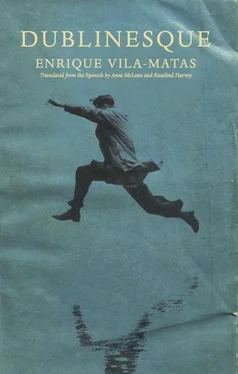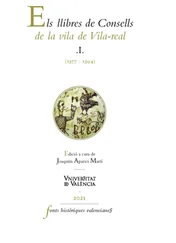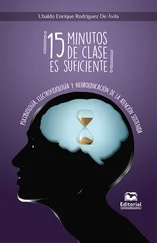“The sorrow of the publisher.”
The anguish that gives every sign of being dementia is gradually causing him to feel lost, drifting strangely through that dangerous childlike area on the edges of his mind, where he knows he might lose himself forever at any moment. But at the last second he manages to escape the danger by thinking of something else, remembering, for instance, that he has a moral intelligence, even though at times he feels this is not much, though sometimes he feels it’s quite a lot. And he escapes from the danger at last by remembering too that next month he’ll go to Dublin. And by recalling a line of Monica Vitti’s in Red Desert , a line that, he now realizes, is almost as dangerous as the most feverish and most obsessively particular wanderings around London’s East End might be for anyone:
“My hair is hurting me.”
He could say the same thing too. Spider would certainly say it. Spider, who walks through life so lost, doesn’t know Riba could imitate him and reconstruct his personality by adapting other people’s memories — he could turn into John Vincent Moon, one of Borges’s heroes, for example, or into an accumulation of literary quotations; he could become a mental enclave where several personalities could find shelter and coexist, and thus, perhaps without even any real effort, manage to shape a strictly individual voice, an ambiguous support for a nomadic, heteronymous profile. .
There’s no doubt Riba has a certain facility for going off on mental tangents and making life more complicated than necessary. He is like a follower of the Italian writer, three of whose books he published, Carlo Emilio Gadda, who was a neurotic as admirable as he was phenomenal: Gadda threw himself into the page he was writing, with all his obsessions. And everything he did was incomplete. In a short article about risotto alla milanese , he made things so complicated that he ended up describing the grains of rice, one by one — including the moment when each one was still enveloped in its little husk, the pericarp — and naturally, he was unable to ever finish the text.
Riba has a tendency to read life like a literary text and sometimes to see the world like a tangled mess or a ball of wool. So that when Celia interrupts the film and his reflections on Gadda and the risotto, and his digression about John Vincent Moon, so she can say, in the most prosaic tone possible, that afterward she will heat up the leftover potatoes au gratin in the oven, he remembers a Jules Renard quote, a perfect snippet: “A young woman from London left this note the other day: ‘I’m going to kill myself, father’s dinner is in the oven.’”
Celia seems to him to be acting as if she’s already a Buddhist, and also as if she’s convinced that everything he thinks leads him to get dangerously lost on the edges of his East End.
So as not to get so lost, Riba turns slightly and looks to the left, at the kitchen. The potatoes au gratin are, in effect, already in the oven. But it doesn’t escape his notice that this is merely a relative truth, as at any time a madwoman, or Spider himself, could come through the door and dispute this piece of evidence and all others, every single one, including the simple truth of the potatoes au gratin.
When they have finished watching Spider , he hurls himself at the computer like a desperate man. The hours of computer abstinence have brought him to the brink of a nervous breakdown. And a serious hairache. On the other hand, not sitting in front of the computer has meant that the pain in his right knee has abated slightly, pain he attributes to an excess of uric acid, although in reality it might simply be arthritis, the onset of old age, why kid himself?
He sits down in front of the computer screen wearing the same expression Spider does that clearly demonstrates his failure to communicate with a world he doesn’t understand. First, he searches for the latest news about himself on Google. Within the last few days, there is none. He then spends some time looking at a huge range of websites and finally comes across an article that seems oddly related to his decision to hold a funeral in Dublin. The writer of the article claims we will arrive sooner than expected at the digitalization of all written knowledge and the disappearance of literary authors, in the interests of producing a single universal book, an almost infinite flow of words, which will be reached, naturally, the writer says, by means of the internet.
The disappearance of literary authors is a topic that touches him deeply. This reality that the web announces for the future, becoming clearer every day, never fails to move him. “But perhaps,” says the writer, “instead of surprise, the predicted end of the printed book might now provoke rejection in the traditional reader. What to say about the writer who sees in this vertigo a sort of attack on the purpose and the nature of his work? However, it would appear that the course has been set and the die cast for paper and ink. No argument will divert its terrible fate, nor is there any clairvoyant or prophet who can predict its survival. The funeral march has begun, and it is futile for those of us who remain loyal to the printed page to protest and rage in the midst of our despair.”
He is struck by the writer saying the funeral march has begun . Then, he decides to open his email and finds the email he expected from a friend, Dominique Gonzalez-Foerster, who finally tells him in detail about the installation she is preparing for the end of July in the Turbine Hall of the Tate Modern. They have been good friends since he published a very comprehensive book on Dominique’s work five years ago. He feels that amidst the general decline of his life, his friendship with the French artist is one of the few things that hasn’t turned into a disaster.
He has always been fascinated by the way Dominique’s installations connect literature and cities, films and hotels, architecture and abysses, mental geographies and authors’ quotations. She is a great lover of the art of quotation and very specifically of Godard’s technique from his early period, when he inserted quotations, the words of others — real or invented — into the action of his films.
Recently, Dominique has been filled with passion for other people’s phrases and is trying to create an apocalyptic culture of the literary quotation, a culture of the end of the line, and as a matter of fact, of the end of the world. In her installation for the Turbine Hall, Dominique, with her dynamic relationship to quotations, wants in part to situate herself in Godard’s wake, while at the same time locating the visitor in a London of 2058, where it has been raining cruelly, without let-up, for years.
The idea — Dominique tells him in her email — is that one sees how a great flood has transformed London, where the incessant rainfall over the last few years has had strange effects; there have been mutations in the urban sculptures, which, invaded by damp, have not just eroded, but have also grown monumentally, as if they were tropical plants or thirsty giants. In order to stop this tropicalization or organic growth, they are stored in the Turbine Hall, surrounded by hundreds of metal bunks that, day and night, cradle men who sleep , and other vagabonds and refugees from the flood.
Dominique plans to project a strange film, more experimental than futuristic, onto a giant screen, which will bring together scenes from Alphaville (Godard), Toute la mémoire du monde (Resnais), Fahrenheit 451 (Truffaut), The Jetty (Chris Marker), and Red Desert (Antonioni): quite an end-of-the-world aesthetic, very much in keeping with the apocalyptic feeling Riba himself has had for some time now.
Читать дальше












